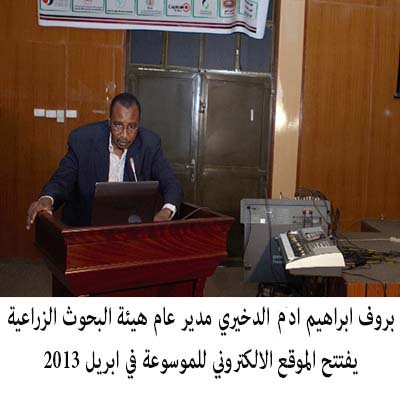البحوث
ELKHTAB MOHAMMED ABDALLA ADAM B.Sc. in Agriculture
Faculty of Agriculture
University of Khartoum
2006
A thesis Submitted to University of Khartoum in partial fulfillment for the requirement of the degree of Master of Science (Agric.).
Supervisor
Dr. Ibrahim Saeed Ibrahim
CO. Supervisor
Dr. Sarra Ahmed Mohamed Saad
Department of Soil and Environment Science
Faculty of Agriculture
University of Khartoum
2010
DEDIACATION
TO MY
FATHER, MOTHER,
BROTHERS AND SISTERS
TO MY TEACHERS
AND MY FRIENDS
With love
ACKNOWLEDGEMENT
Thanks to Allah Almighty who give me the health and courage to complete this work.
I would like to express my deepest thanks and sincere appreciation to my supervisor Dr. Ibrahim Saeed Ibrahim, for his close supervision, valuable suggestions and fruitful criticism throughout the course of the study.
My thanks are also due to my co-supervisor Dr. Sarra A. M. Saad for her valuable advice, supervision and personal guidness.
I am indebted to Ministry of Higher Education and Scientific Research, which sponsored this study.
My sincere gratitude and special thanks are due to all staff of the Department of Environmental pollution- Environment and Natural Recourses Research Institute (ENRRI) - National Center for Research (NCR) and to staff of the Department of Soil and Environment sciences– Faculty of Agriculture – University of Khartoum, for their unlimited help.
My thanks are also extended to my friends and colleagues, who were ready to give any assistance I asked for to complete this work
Abstract
Effect of compost and vermicompost produced from cotton residues and farmyard manure on teff grass (Eragrostis tef Zucc. Trotter) growth.
By: Elkhtab Mohamed abdalla Adam
The aim of this study was to investigate the use of earthworms to increase the rate of decomposition during the process of organic fertilizer production from cotton residues and farmyard manure as well as to compare between the effects of organic fertilizer in comparison with inorganic fertilizers using teff plant (Eragrostis tef Zucc.Trotter) as a test crop.
Composting was done in the demonstration Farm - Faculty of Agriculture University of Khartoum – Shambat. The four organic fertilizers were: cotton residues +soil, cotton residues +soil+ earthworms, cotton residues + soil+ farmyard manure and cotton residues + soil+ farmyard manure +earthworms. During composting sample were taken monthly and chemically analyzed for the following: pH, electrical conductivity, nitrate, ammonium, ash, total phosphorus, total nitrogen, organic carbon, carbon: nitrogen ratio, total potassium and trace elements (Mn, Fe, Cu and Zn).
Two pot experiments were conducting using teff plant for two seasons during 2008-2009, the effect of the four organic fertilizers was compared to that chemical fertilizer and control. The treatments were : cotton residues +soil = 1N, cotton residues + soil = 2N, cotton residues + soil+ earthworms =1N, cotton residues + soil+ earthworms = 2N, cotton residues +soil +farmyard manure = 1N, cotton residues +soil + farmyard manure =2N, cotton residues +soil+ farmyard manure+ earthworms = 1N, cotton residues + soil+ farmyard manure+ earthworms = 2N, urea = 1N+super phosphate =1P, urea = 2N+super phosphate =1P and control =0N and 0P), the design used was complete randomized design(CRD) with four replicates.
At the end of both seasons plant growth parameters measured included: plant height (cm), leaves number, tillers number and fresh weight. In addition plant samples were analyzed for nitrogen, phosphorus and potassium. Acidity, electrical conductivity, total nitrogen, available phosphorus and potassium were also determined in plant growth media.


